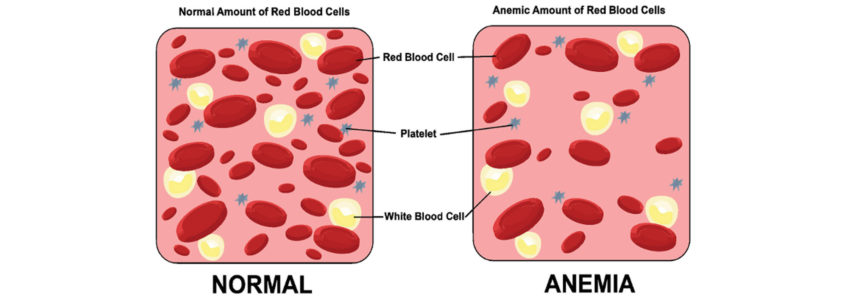Anemia

- Fatigue and tiredness
- Shortness of breath
- Pale skin
- Dizziness and lightheadedness
- Chest pain
- rapid heartbeat and irregular heart rhythm
- Your body in not producing enough hemoglobin or red blood cells: Following conditions give rise to anemia from this cause:
- Lack of Iron needed to produce hemoglobin: inadequate intake of iron containing diet, pregnancy, breastfeeding and frequent blood donation can deplete iron store and cause anemia.
- Deficiency of vitamins needed to produce red blood cells: Eating little or no meat may cause vitamin B12 deficiency. Overcooking and eating too few vegetables may cause a folate deficiency.
- Disease of gastrointestinal tract where the body cannot utilize and absorb nutrients in the diet. for e.g, in celiac disease.
- Low levels of hormone called erythropoietin required for RBC production: it occurs in conditions such as chronic kidney diseases and cancer, chemotherapy
- Lead exposure: lead is toxic to the bone marrow leading to fewer red blood cells production.
- Your body destroys red blood cells prematurely: It may occur in the following conditions:
- Infection: such as septicemia, HIV, malaria, kala azar can cause premature destruction of red blood cells.
- Red blood cells that are defective are destroyed by the body . These conditions include Spherocytosis, Glucose 6- phosphate dehydrogenase (G6PD) deficiency, thalassemia and sickle cell anemia.
- In certain autoimmune conditions immune cells attack the RBCs directly with antibodies and decrease their lifespan.
- Your body is losing hemoglobin from chronic blood loss: It may be due to the following reasons:
- Bleeding ulcers
- Bleeding hemorrhoids
- Gastrointestinal or other malignancies
- Heavy menstrual bleeding
- Prolonged use of NSAIDs such as aspirin, ibuprofen which can cause gastritis and ulcers
- Worm infestations specially hookworms
- Anemia caused by deficiency of iron, vitamin b12 and folic acid is treated by nutritional supplements , oral pills and injections.
- foods high in iron : red meat, poultry, kidney beans, dark green leafy vegetables
- Anemia caused by blood loss from peptic ulcers needs treatment of peptic ulcers.
- Anemia from menstrual bleeding may need hormonal treatment to stop bleeding.
- Hookworm infection can be treated with medications.
Anemia
Anemia is a condition where your hemoglobin level is low. Hemoglobin is the substance found in the red blood cell that carries oxygen in the blood. When you are anemic the oxygen carrying capacity of you blood in reduced and it may not be enough to meet the demands of your body. Anemia is not a disease in itself but a manifestation of an underlying disease.
Symptoms
Causes
Anemia occurs when:
Diagnosis
Anemia is diagnosed by a blood test that measures the level of hemoglobin in the blood. If you have mild anemia you may not have any symptoms. You may need further tests like endoscopy and a bone marrow biopsy to find the underlying cause anemia. A common cause of anemia in developing country is hookworm infestation which is diagnosed by identifying the parasite in stool test.
Treatment options
in general , treatment of anemia depends on identification and management of the underlying disease causing anemia.
When anemia is severe enough to cause severe symptoms like chest pain, shortness of breath and dizziness, urgent blood transfusion is needed until symptoms resolve.
When to seek a doctor?
Anemia is usually diagnosed on blood tests done for other reasons. But if you get easily tired, suffer from chronic fatigue that cannot be explained you may have anemia. See a doctor or do a blood test to check your hemoglobin level.



Send us your feedback on this article